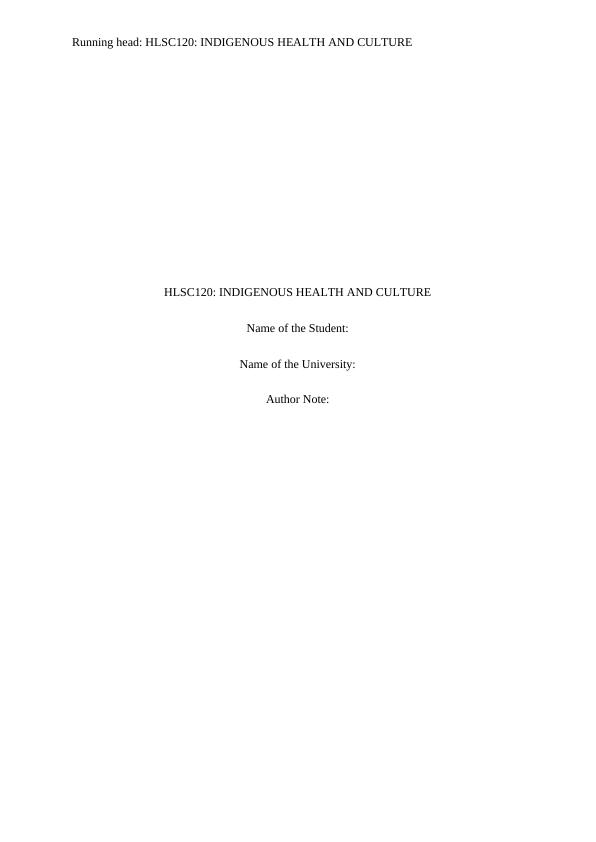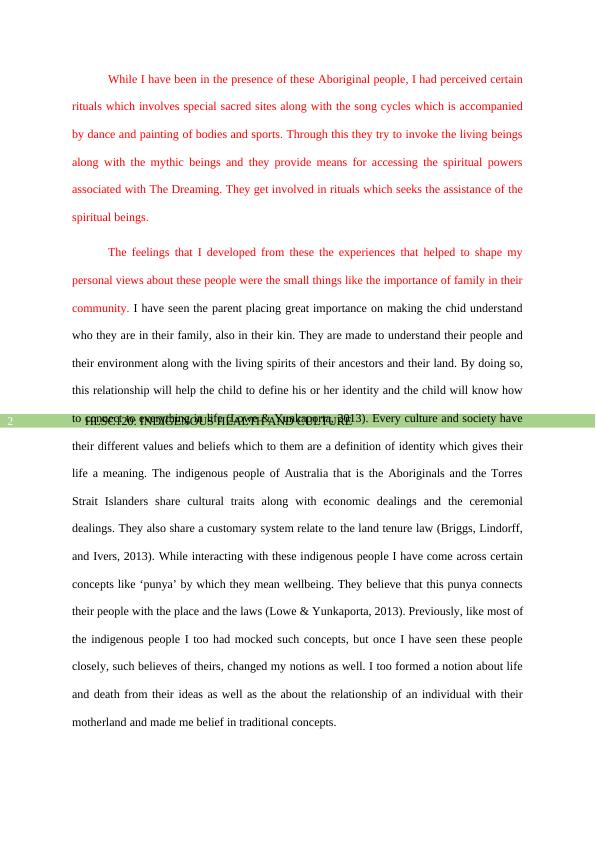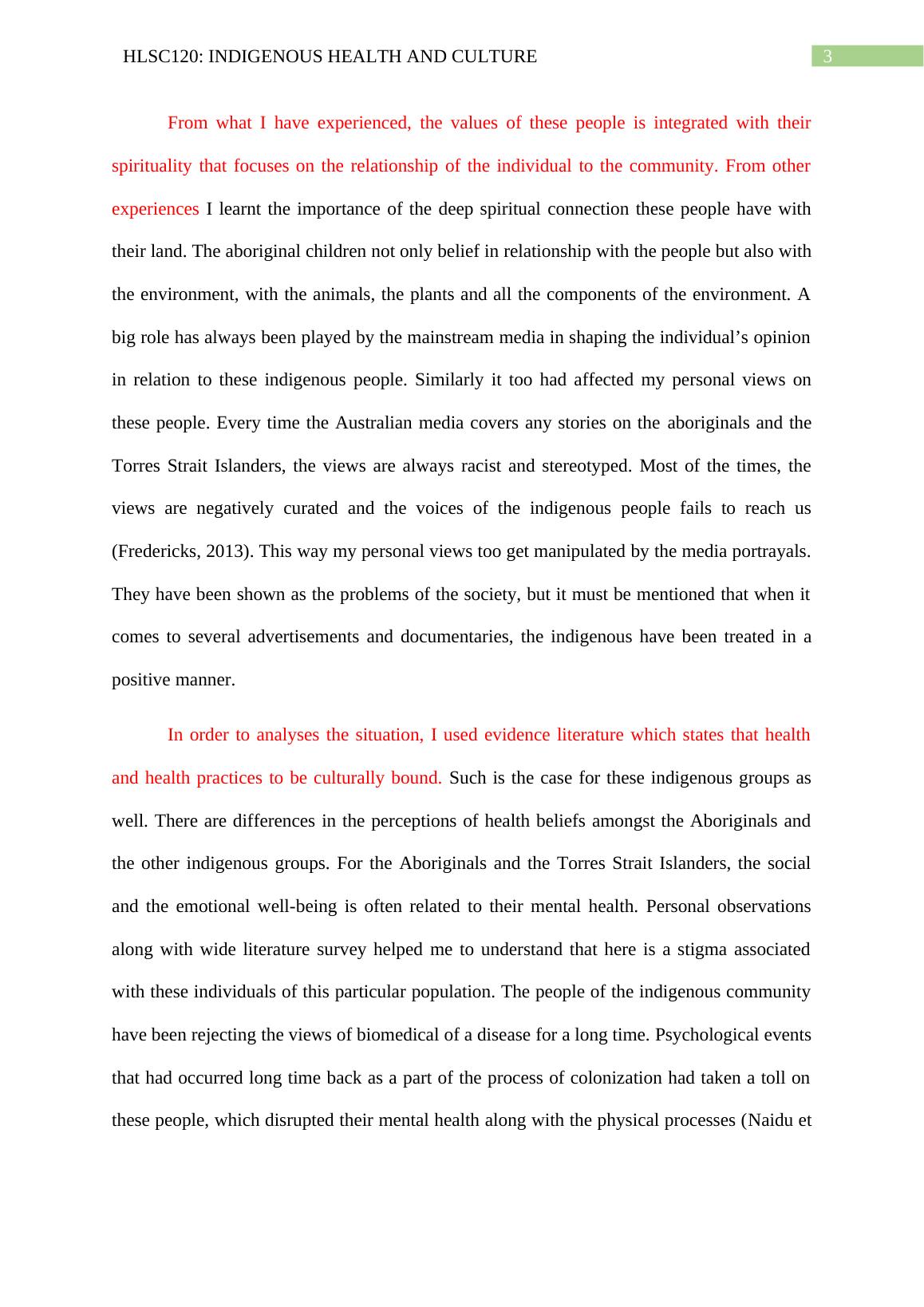HLSC120 - Indigenous Health and Culture
6 Pages1232 Words41 Views
Added on 2021-04-16
HLSC120 - Indigenous Health and Culture
Added on 2021-04-16
ShareRelated Documents
Running head: HLSC120: INDIGENOUS HEALTH AND CULTUREHLSC120: INDIGENOUS HEALTH AND CULTUREName of the Student:Name of the University:Author Note:

HLSC120: INDIGENOUS HEALTH AND CULTURE2While I have been in the presence of these Aboriginal people, I had perceived certainrituals which involves special sacred sites along with the song cycles which is accompaniedby dance and painting of bodies and sports. Through this they try to invoke the living beingsalong with the mythic beings and they provide means for accessing the spiritual powersassociated with The Dreaming. They get involved in rituals which seeks the assistance of thespiritual beings. The feelings that I developed from these the experiences that helped to shape mypersonal views about these people were the small things like the importance of family in theircommunity. I have seen the parent placing great importance on making the chid understandwho they are in their family, also in their kin. They are made to understand their people andtheir environment along with the living spirits of their ancestors and their land. By doing so,this relationship will help the child to define his or her identity and the child will know howto connect to everything in life (Lowe & Yunkaporta, 2013). Every culture and society havetheir different values and beliefs which to them are a definition of identity which gives theirlife a meaning. The indigenous people of Australia that is the Aboriginals and the TorresStrait Islanders share cultural traits along with economic dealings and the ceremonialdealings. They also share a customary system relate to the land tenure law (Briggs, Lindorff,and Ivers, 2013). While interacting with these indigenous people I have come across certainconcepts like ‘punya’ by which they mean wellbeing. They believe that this punya connectstheir people with the place and the laws (Lowe & Yunkaporta, 2013). Previously, like most ofthe indigenous people I too had mocked such concepts, but once I have seen these peopleclosely, such believes of theirs, changed my notions as well. I too formed a notion about lifeand death from their ideas as well as the about the relationship of an individual with theirmotherland and made me belief in traditional concepts.

HLSC120: INDIGENOUS HEALTH AND CULTURE3From what I have experienced, the values of these people is integrated with theirspirituality that focuses on the relationship of the individual to the community. From otherexperiences I learnt the importance of the deep spiritual connection these people have withtheir land. The aboriginal children not only belief in relationship with the people but also withthe environment, with the animals, the plants and all the components of the environment. Abig role has always been played by the mainstream media in shaping the individual’s opinionin relation to these indigenous people. Similarly it too had affected my personal views onthese people. Every time the Australian media covers any stories on the aboriginals and theTorres Strait Islanders, the views are always racist and stereotyped. Most of the times, theviews are negatively curated and the voices of the indigenous people fails to reach us(Fredericks, 2013). This way my personal views too get manipulated by the media portrayals.They have been shown as the problems of the society, but it must be mentioned that when itcomes to several advertisements and documentaries, the indigenous have been treated in apositive manner.In order to analyses the situation, I used evidence literature which states that healthand health practices to be culturally bound. Such is the case for these indigenous groups aswell. There are differences in the perceptions of health beliefs amongst the Aboriginals andthe other indigenous groups. For the Aboriginals and the Torres Strait Islanders, the socialand the emotional well-being is often related to their mental health. Personal observationsalong with wide literature survey helped me to understand that here is a stigma associatedwith these individuals of this particular population. The people of the indigenous communityhave been rejecting the views of biomedical of a disease for a long time. Psychological eventsthat had occurred long time back as a part of the process of colonization had taken a toll onthese people, which disrupted their mental health along with the physical processes (Naidu et

End of preview
Want to access all the pages? Upload your documents or become a member.
Related Documents
Reflection on Indigenous Australians: Personal Views, Influences, Comparison and Inferencelg...
|6
|1322
|85
Impact of Corporate Social Responsibility Essaylg...
|8
|2052
|35
Australian Aboriginal Studieslg...
|6
|1112
|39
The Role of Culture in Shaping Health Beliefs: A Reflective Assignmentlg...
|6
|1311
|197
Nursing Reflective Essay on Indigenous Health Issueslg...
|11
|2787
|226
Culture and Mental Health: Engaging with Aboriginal and Torres Strait Islander Communitieslg...
|5
|1174
|349
